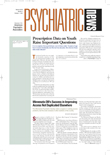Researchers have long focused on dopamine dysfunction as a likely source of mental illness, in particular implicating abnormalities in the dopamine system in schizophrenia, bipolar disorder, and attention-deficit/hyperactivity disorder. A new report now indicates that in schizophrenia and bipolar disorder, dopamine itself may not be the culprit, but rather other molecular systems in the brain that control dopamine transmission.
In a report published in the December 13, 2002, online edition of the Proceedings of the National Academies of Science, researchers from the University of Maryland, Pennsylvania State College of Medicine, and Yale University say that an increase in the activity of a particular regulatory protein in the brain may be the root of both disorders. Neuronal calcium sensor-1 (NCS-1), according to the report, is abnormally elevated in the dorsolateral prefrontal cortex of postmortem samples from patients with schizophrenia or bipolar disorder.
Recent research has suggested that dopamine receptor-interacting proteins (DRIPs) may play a role in modifying and expanding the functionality of dopamine receptors. In addition, using tissue samples from the Stanley Foundation Neuropathology Consortium, the Maryland-led team had previously shown that levels of a particular DRIP, calcyon, is elevated to nearly twice the normal levels in the prefrontal cortices of patients with schizophrenia. Calcyon has been implicated in the regulation of dopamine-D1 receptors.
Rigorous Methods
In the current study, the Maryland team hypothesized that NCS-1, also a DRIP, could also be involved in dopamine dysregulation. NCS-1 has been shown to be present in cells throughout the brain and is involved in modulating the sensitivity of the dopamine-D2 receptor. When levels of NCS-1 increase, the receptor becomes less sensitive to dopamine, and lower levels of NCS-1 allow the receptor to become more sensitive to the neurotransmitter.
The researchers were careful to conduct the study using rigorous methodology in an effort to eliminate confounding variables. Using postmortem tissue samples, once again from the Stanley Foundation, the study analyzed levels of NCS-1 in the dorsolateral prefrontal cortex of 60 individuals, comparing 15 patients in each of three diagnostic groups: schizophrenia, major depression, and bipolar disorder, with 15 control subjects with no history of psychiatric or neurological disorders. Each of the 60 samples was tested in triplicate, and an average level of NCS-1 measured across the three tests was used for analysis.
The diagnostic groups were matched according to age, race, gender, anatomical location of the actual tissue sample, average time of tissue storage since death, and pH of the tissue sample. All of the analyses of tissue samples was completed in a blind manner. Because it has been shown that treatment with haloperidol for periods of at least three months can cause changes in both D1 and D2 receptors, samples were also analyzed from five drug-naïve and five haloperidol-treated rhesus monkeys to determine whether levels of NCS-1 are drug dependent.
Pattern Emerges
The team found that the dorsolateral prefrontal cortices of patients with schizophrenia and patients with bipolar disorder had significantly elevated levels of NCS-1—on average 50 percent higher than the normal, control individuals. No significant difference was detected in levels of NCS-1 between the control individuals and patients with major depression.
In addition, no significant difference was found when the researchers compared levels of NCS-1 in patients who had schizophrenia or bipolar disorder and had been taking antipsychotic medications for prolonged periods at death and patients in the same sample groups who were drug free. The comparison between the haloperidol-exposed and drug-free rhesus monkeys also failed to show any statistically significant difference in levels of NCS-1 in the dorsolateral prefrontal cortex.
The consequences of increased levels of NCS-1 are intriguing, though not well understood. “Based on [D2 receptor] involvement in inhibition of dorsolateral prefrontal cortex activity,” the researchers concluded, “the observed NCS-1 up-regulation might be expected to result in decreased activation of the dorsolateral prefrontal cortex in schizophrenia and bipolar patients. Furthermore, this could occur without any detectable change in the level of [D2 receptors].”
It is also possible, they added, that increases in NCS-1 could affect signal processing by promoting particular potassium currents in neuronal cells, which would indirectly affect calcium regulation, altering neurotransmission.
The research was funded by the National Institute of Mental Health Conte Center for Research in Mental Disorders and the Essel Foundation.
The study, “Up-Regulation of Neuronal Calcium Sensor-1 (NCS-1) in the Prefrontal Cortex of Schizophrenic and Bipolar Patients,” is posted on the Web at www.pnas.org/cgi/doi/10.1073/pnas.232693499. ▪
PNAS 2003 100 313
